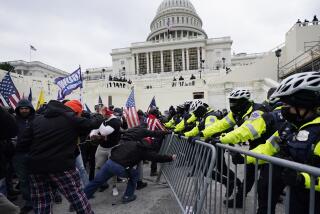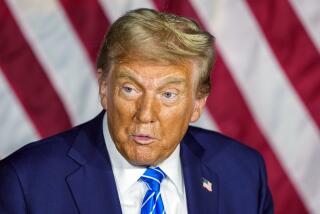Flynn guilty plea brings Mueller investigation directly into the White House

Former national security advisor Michael Flynn said Friday he pleaded guilty to lying to the FBI because his actions were wrong and he wanted to “set things right.”
Reporting from Washington — The investigation into Russian meddling in last year’s election hit the White House for the first time Friday as President Trump’s former national security advisor, Michael Flynn, pleaded guilty to lying to the FBI about his contacts with the Russian ambassador and agreed to help investigators as they focus on other presidential aides.
U.S. District Judge Rudolph Contreras said the retired three-star Army general had agreed to provide “substantial assistance for prosecution of another person,” giving special counsel Robert S. Mueller III a critical leg up as he pursues the case.
The documents don’t identify that person. But a former official said Jared Kushner, the president’s son-in-law and senior advisor, was the “very senior member” of Trump’s transition team who directed Flynn to contact Russia’s envoy last year, according to the filings. The former official identified K.T. McFarland, who was Flynn’s deputy in the White House, as the “senior member” of the team also cited in prosecution papers.
According to court papers, Flynn “willfully and knowingly” made “false, fictitious and fraudulent” statements to FBI agents when they interviewed him at the White House on Jan. 24, four days after Trump was inaugurated, as part of the investigation into whether any of the president’s aides had assisted Russian interference in the 2016 presidential election. Flynn pleaded guilty to a single count on Friday.
“Guilty, your honor,” Flynn, 58, said in a softer version of the gravelly voice he used to denounce Hillary Clinton at the Republican National Convention in July 2016 and lead chants of “Lock her up!” As he exited the federal courthouse, passersby heckled him by shouting, “Lock him up!”
The former Army intelligence officer had impressed Trump with his explosive criticisms of Democrats and hard-edged views on fighting terrorism. Now he poses a potential threat to the White House.
Flynn’s cooperation is “going to open the door to a whole avenue of information,” said Bradley D. Simon, a former federal prosecutor in Washington and New York. “Obviously, the president and those in the White House have to be deeply concerned about today’s developments,’’ he said.
“Flynn has been a live torpedo in the water for months,” said Jonathan Turley, a professor at George Washington Law School. “We all agreed that he had the range to hit anyone in the White House. The question is whether he had the load to do any damage. We still don’t know the answer to that question.”
Julie Rose O’Sullivan, a Georgetown University law professor and former federal prosecutor, said Mueller would have insisted on having a clear sense of what Flynn could provide before cutting a plea deal. “You’d never buy a pig in a poke,” she said.
Mueller has not charged anyone with helping Russian hacking or other election-related misdeeds. But for the first time, he has charged a former White House official in a case centered on high-level communications with the Russian government. Mueller thus sent a clear warning to those still in the crosshairs.
The single charge against Flynn, who agreed to cooperate with Mueller’s team, stands in sharp contrast to the harsh case filed against Trump’s former campaign manager, Paul Manafort, and his deputy, who refused to cooperate. They were charged Oct. 30 with a dozen counts of fraud, conspiracy and money laundering.
Flynn was released Friday on his own recognizance. Manafort’s lawyers this week asked a judge to approve a bail package that would allow him limited travel in exchange for pledging properties worth $11.6 million.
It’s not clear whether those Flynn spoke to about his conversations with the Russian ambassador are also at risk.
During the campaign, Trump put Kushner in charge of outreach to foreign governments, and Kushner has since served as a senior advisor to his father-in-law on a broad range of issues, including the Middle East.
McFarland was deputy national security advisor under Flynn but was ousted by H.R. McMaster, Flynn’s successor, in April, and later nominated as ambassador to Singapore. The Senate Foreign Relations Committee approved the nomination in September but it has not come up for a Senate vote.
In a statement Friday, Flynn cited his 33 years of service in the Army, including five years in combat in Iraq and Afghanistan. He called it “extraordinarily painful” to have endured “false accusations of ‘treason’ and other outrageous acts” in recent months.
“But I recognize that the actions I acknowledged in court today were wrong, and through my faith in God, I am working to set things right,” he added. “My guilty plea and agreement to cooperate with the special counsel’s office reflect a decision I made in the best interests of my family and of our country.”
Trump’s lawyer, Ty Cobb, downplayed Flynn’s promise of cooperation. “Nothing about the guilty plea or the charge implicates anyone other than Mr. Flynn,” he said in a statement released by the White House.
Cobb also downplayed Flynn’s importance, saying that he was “at the White House for 25 days during the Trump Administration and a former Obama administration official.”
The Obama administration fired Flynn as head of the Defense Intelligence Agency in 2014 for what it said was mismanagement. He became one of Trump’s closest aides during the campaign and the transition, both as a surrogate and as a policy advisor.
After the election, Trump named Flynn national security advisor, one of the most senior positions in the White House. But Flynn was forced to resign weeks later when the media disclosed he had misled Vice President Mike Pence and other officials about his contacts with Sergey Kislyak, then Russia’s ambassador in Washington.
The charge Flynn pleaded guilty to Friday focused chiefly on those contacts. According to court papers, Kislyak contacted Flynn on Dec. 28 after President Obama announced he was imposing sanctions on Russia in response to its meddling in the U.S. election.
The next day, the filing says, Flynn “called a senior official” — apparently McFarland — on Trump’s transition team, who was with other aides at Trump’s Mar-a-Lago resort in Florida, to seek guidance. They discussed the potential impact of the sanctions on Trump’s foreign policy goals.
After the call, Flynn called Kislyak and “requested that Russia not escalate the situation.” Flynn then spoke again with the senior official in the transition team “to report on the substance of his call … including their discussion of the U.S. sanctions.”
Russian President Vladimir Putin indicated the next day that Russia would not retaliate for the U.S. sanctions; Kislak called Flynn to share the news, and he informed the transition team.
But in his Jan. 24 interview with the FBI, Flynn “falsely stated” that he did not ask Kislyak about the sanctions, and did not remember the follow-up conversations, the charging document says.
Flynn also pleaded guilty to lying to the FBI about talking to Kislyak about a United Nations resolution passed last December criticizing Israeli settlements on the West Bank. The Obama administration was planning to abstain from the vote, a rare move by the U.S., which normally vetoes U.N. resolutions critical of Israel.
On Dec. 22 , Flynn was directed by a “very senior member” of the transition team — apparently Kushner — to contact officials from Russia and other foreign governments “to influence those governments to delay the vote or defeat the resolution, according to court papers.
Flynn called Kislyak the same day and asked Russia, which holds a veto in the U.N. Security Council, to oppose the settlement resolution. Kislyak called back the next day and said Russia would not vote no, the prosecution document says.
A version of the resolution passed later that day after the U.S. abstained.
Court papers also cited Flynn, but did not separately charge him, for making false statements in March when he belatedly registered as a foreign agent for Turkey. Flynn’s company, the Flynn Intel Group, was paid $530,000 last year to help undermine Fethullah Gulen, a Turkish cleric living in Pennsylvania who has been a political enemy of Turkish President Recep Tayyip Erdogan.
Stephen I. Vladeck, a University of Texas law professor, said Mueller may be trying with Flynn’s help to build a criminal case against other Trump administration officials — and even Trump himself — for obstructing his investigation and covering up their dealings with Russia.
“A coverup can be a crime even if there’s no crime to cover up,” Vladeck said.
Times staff writers Joseph Tanfani and Noah Bierman contributed to this report.
Follow live coverage of the Trump administration on Essential Washington »
Twitter: @chrismegerian
Twitter: @davidcloudLAT
UPDATES:
4:05 p.m.: This story was updated with additional details from court documents and reactions from outside experts.
1:05 p.m.: This story was updated with details from court documents.
This story was originally published at 9:35 a.m.
More to Read
Get the L.A. Times Politics newsletter
Deeply reported insights into legislation, politics and policy from Sacramento, Washington and beyond. In your inbox three times per week.
You may occasionally receive promotional content from the Los Angeles Times.













